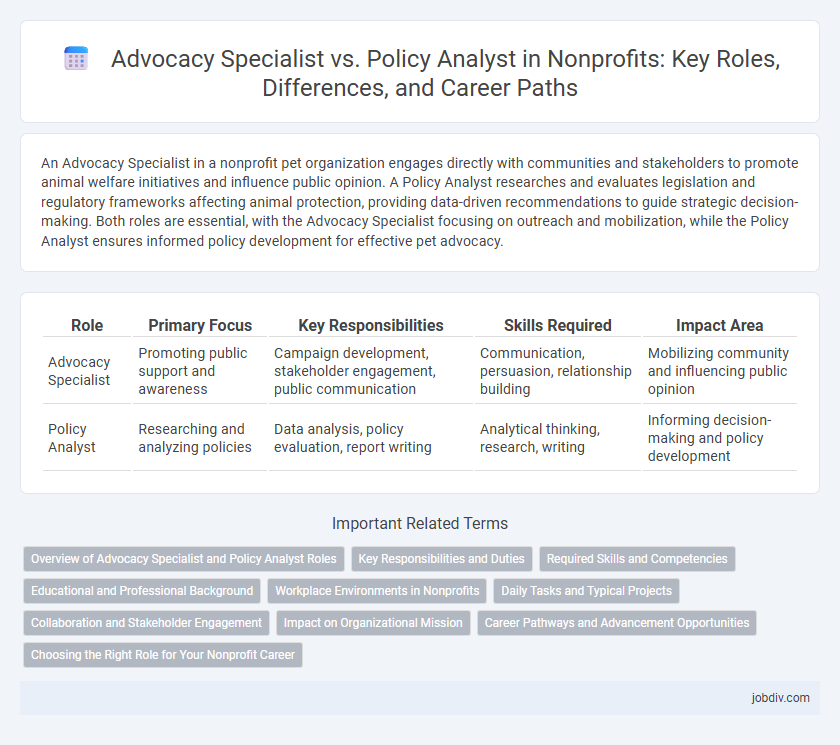An Advocacy Specialist in a nonprofit pet organization engages directly with communities and stakeholders to promote animal welfare initiatives and influence public opinion. A Policy Analyst researches and evaluates legislation and regulatory frameworks affecting animal protection, providing data-driven recommendations to guide strategic decision-making. Both roles are essential, with the Advocacy Specialist focusing on outreach and mobilization, while the Policy Analyst ensures informed policy development for effective pet advocacy.
Table of Comparison
| Role | Primary Focus | Key Responsibilities | Skills Required | Impact Area |
|---|---|---|---|---|
| Advocacy Specialist | Promoting public support and awareness | Campaign development, stakeholder engagement, public communication | Communication, persuasion, relationship building | Mobilizing community and influencing public opinion |
| Policy Analyst | Researching and analyzing policies | Data analysis, policy evaluation, report writing | Analytical thinking, research, writing | Informing decision-making and policy development |
Overview of Advocacy Specialist and Policy Analyst Roles
An Advocacy Specialist drives public support and awareness for nonprofit causes by engaging stakeholders and organizing campaigns, emphasizing communication and grassroots mobilization skills. A Policy Analyst conducts research, evaluates legislation, and provides data-driven recommendations to influence policy decisions, prioritizing analytical and strategic expertise. Both roles are essential in shaping nonprofit impact, with Advocacy Specialists focusing on external engagement and Policy Analysts on internal policy development.
Key Responsibilities and Duties
Advocacy Specialists focus on mobilizing public support, developing campaigns, and engaging stakeholders to influence policy decisions, while Policy Analysts conduct research, evaluate data, and prepare detailed reports to inform policymaking. Advocacy Specialists prioritize communication strategies, coalition-building, and grassroots organizing, whereas Policy Analysts emphasize legislative analysis, policy evaluation, and recommendations based on evidence. Both roles are essential in nonprofit organizations, with Advocacy Specialists driving action and Policy Analysts providing the analytical foundation for effective advocacy.
Required Skills and Competencies
Advocacy Specialists require strong communication skills, grassroots mobilization expertise, and the ability to build coalition partnerships to influence public opinion and policymaking. Policy Analysts must excel in research, data analysis, and critical thinking to evaluate legislation and provide evidence-based policy recommendations. Both roles demand proficiency in stakeholder engagement and a deep understanding of the political and social landscape affecting nonprofit missions.
Educational and Professional Background
Advocacy Specialists often hold degrees in social work, communications, or public relations, emphasizing skills in grassroots mobilization and stakeholder engagement. Policy Analysts typically possess advanced degrees in public policy, political science, or economics, focusing on data analysis, legislative processes, and regulatory impact assessments. Both roles require strong research capabilities, but Policy Analysts lean more toward quantitative analysis while Advocacy Specialists prioritize strategic communication.
Workplace Environments in Nonprofits
Advocacy Specialists in nonprofit workplace environments engage directly with community stakeholders and policymakers to advance specific social causes through campaigns and public outreach, emphasizing communication and grassroots mobilization. Policy Analysts focus on researching, evaluating, and developing evidence-based policies, providing nonprofits with data-driven recommendations to shape effective organizational strategies and influence legislative agendas. Both roles require a deep understanding of nonprofit mission-driven work, but Advocacy Specialists prioritize external engagement while Policy Analysts concentrate on internal policy formulation and impact assessment.
Daily Tasks and Typical Projects
Advocacy Specialists focus on mobilizing community support, organizing campaigns, and engaging with stakeholders to influence public opinion and policy decisions, often managing grassroots efforts and public events. Policy Analysts conduct in-depth research, analyze legislation, and develop policy recommendations to support organizational goals, frequently producing reports, briefs, and data-driven insights for decision-makers. Both roles collaborate closely but differ in execution, with Advocacy Specialists prioritizing communication and outreach while Policy Analysts emphasize research and strategic planning.
Collaboration and Stakeholder Engagement
An Advocacy Specialist excels in building partnerships with community organizations and mobilizing grassroots support to influence public opinion and policy decisions. A Policy Analyst focuses on engaging with government agencies, legislators, and expert stakeholders to conduct research and develop evidence-based policy recommendations. Both roles require strong collaboration skills, but the Advocacy Specialist prioritizes stakeholder engagement at the community level while the Policy Analyst emphasizes collaboration within formal policymaking processes.
Impact on Organizational Mission
Advocacy Specialists drive grassroots support and public engagement, directly influencing policy changes that align with the nonprofit's mission, enhancing community impact. Policy Analysts provide in-depth research and strategic recommendations, shaping organizational priorities through data-driven insights to advance long-term goals. Together, they ensure mission alignment by combining public mobilization with evidence-based policy strategies for sustainable social change.
Career Pathways and Advancement Opportunities
Advocacy Specialists focus on mobilizing public support and engaging stakeholders to influence policy outcomes, often advancing into roles such as Campaign Manager or Director of Advocacy within nonprofits. Policy Analysts conduct in-depth research and data analysis to inform policy development, typically progressing to Senior Analyst or Policy Director positions in think tanks or nonprofit organizations. Both career paths offer opportunities for specialization and leadership, with Advancement driven by expertise in communication, research, and strategic planning.
Choosing the Right Role for Your Nonprofit Career
Advocacy Specialists focus on mobilizing communities and influencing public opinion through campaigns and grassroots efforts, making them ideal for nonprofits seeking direct engagement and widespread support. Policy Analysts concentrate on researching, evaluating, and recommending policy changes, providing nonprofits with data-driven strategies to shape legislation and funding priorities. Selecting the right role depends on whether your nonprofit prioritizes external advocacy and public mobilization or internal policy development and strategic analysis.
Advocacy Specialist vs Policy Analyst Infographic

 jobdiv.com
jobdiv.com